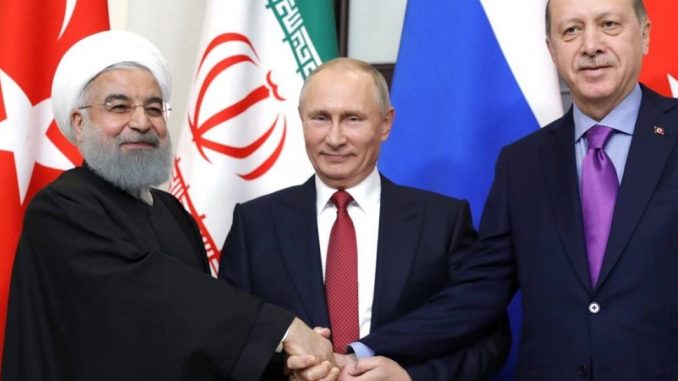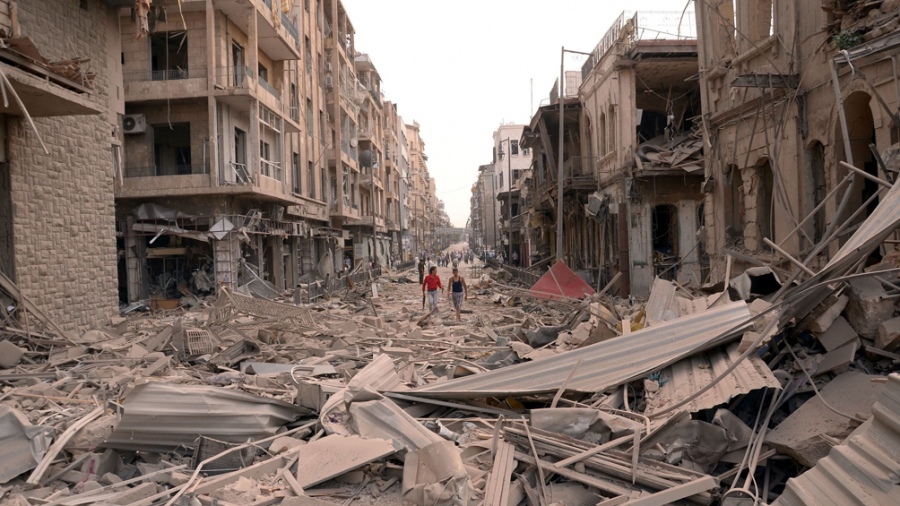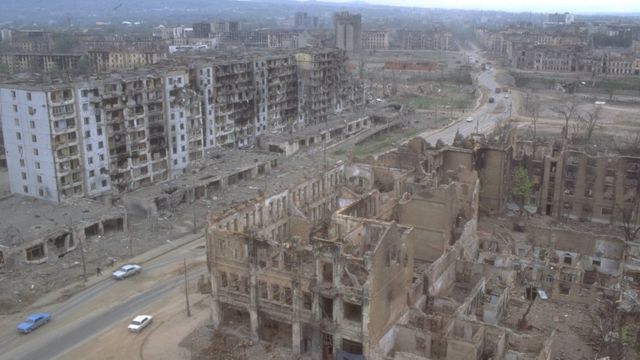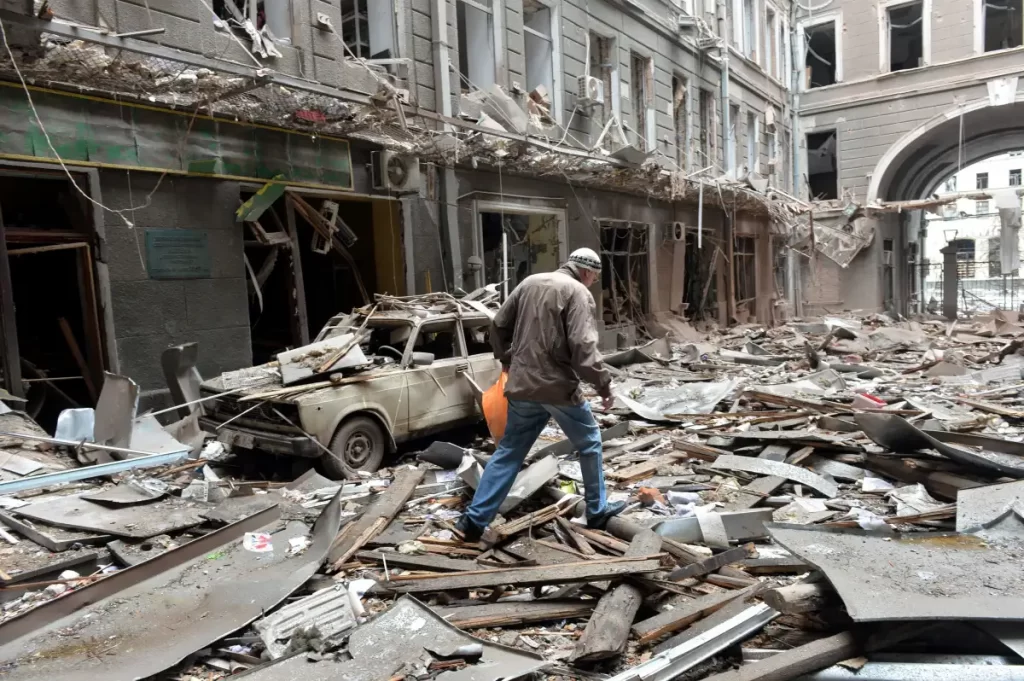
By Sergio García MST, FITU – Argentina
The war in Ukraine brought new debates. The imperious need to confront the expansionist strategy of the US and NATO is an evident fact. Although at the same time, being clear about this is not enough to understand what is happening in Ukraine and Eastern Europe. And even less, to understand the dynamics of Russia and why it does not reflect a progressive sector, but another imperialist power on the rise, now invading Ukraine and attacking its population. We’ll address these usual debates.
Brazilian intellectual Emir Sader wrote for the Argentine newspaper Pagina 12: “The third decade of the new century thus projects a new form of cold war…Compared to the strength it had in the first cold war, whether in the political, economic, technological or even military field, the United States is flagrantly weaker. In the Ukraine crisis, even the US military superiority turned out to be relative, since Russia’s initiative and audacity neutralized its capacity for action…The 21st century will continue to be a century of dispute between the decline of US hegemony and the rise of forces in favor of a multipolar world”.
In this way, Sader gives account of a world where there is only one imperialist side, the one commanded by the US, and opposite there is only a positive side, commanded by China and Russia, which want a multipolar world. From this it follows that the latter should be supported.
Following the same logic, Atilio Boron, who like Sader represents a campist voice that gives Russia a progressive role, says about the war in Ukraine that it is “a tragedy that could have been avoided and before which there is no possible neutrality. There is an aggressor side: the United States and NATO, and an aggressed side, Russia. There can be no confusion whatsoever”.
We could go on quoting similar texts of campist intellectuals who rely on the healthy need to confront the U.S. and NATO in order to give unhealthy support to Putin and the Russian expansionist regime, directly responsible not only for the invasion and massacres in Ukraine, but also for similar actions in several countries. And of a permanent internal repression in Russia, where he heads a reactionary and Bonapartist capitalist regime.
Russia, its history and present times
As socialist militants, defenders of the best teachings of Leninism and Trotskyism, we have nothing to do with the positions encouraged by the pro-imperialist press and its ideologues, who seek to take advantage of Putin’s invasion of Ukraine to generate an anti-Russian sentiment, indirectly linking it as a synonym of anti-left, anti-communism. We are defenders of the revolutionary history of Soviet Russia, the most advanced with the working class in power, initiating an epochal change in the history of humanity. Precisely that revolutionary gesture came to cut the decadence of the oppressive tsarist empire and all its Gran-Russian, chauvinist and “prison of the peoples” visions, as Lenin denounced at the time. The same imperial and oppressive pretensions that today, in another context and another time, reappear in all their glory. Oppression that at the time Stalin had also promoted as the political head of the bureaucracy, which later became restorationist. The history of Russia has an almost permanent essence of imperial policies and actions over all the peoples of the region, a behavior that was not so only in the brief period of the boom years of the Russian revolution led by Lenin, Trotsky and the Bolsheviks.
Having reached a new millennium, what has been happening for years inside Russia, and as an extension of that reality in its foreign policy, has nothing to do with that progressive and revolutionary tradition of Bolshevism. After the fall of the counterrevolutionary Stalinist apparatus and the advance of the restoration process, Russia became a new capitalist power, which, after a first moment of setback marked in the 1990s and early 2000s, in the last fifteen years has been taking steps to recover regional weight and reinsert itself in the world dispute, now as a capitalist power. Plus taking advantage of the global crisis of 2008, the weakening of U.S. and European imperialism.
Those who, from an anti-imperialist position against the US, at the same time hide the regressive and reactionary role of Russia on the world scene, consciously cover up the fact that the Russian regime under Putin has been committing atrocities in various countries. At the same time it is advancing in its military, economic and political influence throughout its zone of influence, and at a slower pace, but advancing, in various continents of the world.
That we have to confront the plans of the U.S. as the main imperialist power is not something we have to discuss, logically we must always do so as a central task. The debate is different. And it is that Putin’s defenders remain silent regarding last year, when the actions of the Russian government and its military power were key to repress the popular and massive revolts in Belarus and Kazakhstan, which had huge and progressive popular rebellions against adjustment plans, and their governments had Putin’s support to stop the revolts. Nor do they say anything about their previous incursion in Syria, in support of a bloody dictatorship of decades, with the Russian army playing a key role in stopping the Arab Spring in such an important Middle Eastern country. Or its incursions against the Chechen people or Ukraine itself years ago. Or its current friendships and agreements with Israel, Taliban, with European right-wingers and, lately, even with Bolsonaro.
Now, acting in opposition to the best of the Russian and Leninist tradition that was at the forefront in granting the Ukrainian people their right to self-determination, the mighty Russian army under Putin invades, destroys, kills civilians and pretends to steer the destiny of a semi-colonial country at will. However, for the camp, Russia is the victim. In Borón’s words, “there can be no confusion whatsoever”. But these are not confusions but conscious deceptions. Because it can never be positive in order to confront an imperialist power like the US and NATO, to support and justify other powers with ongoing imperialist plans and actions.

Russia is also imperialist
This is a definition denied by reformist and campist intellectuals who see the world as if there were only two sides: an imperialist and bad one and a good and positive multipolar bloc. We have already explained the regressive role that Russia played all these years in all the countries where it intervened politically and militarily, in function of strengthening its objectives as a power and attacking social and democratic rights of entire peoples, inside and outside its borders.
But also in the anti-capitalist and socialist left there are debates and nuances or differences in this regard. All over the world the left debates about what Russia is and what role it plays. For example in our country, within the Left Unity Front, there are comrades who do not consider Russia to be an imperialist power. For example the comrades of the PTS denounce Russia in its attack on Ukraine, but at the same time they do not consider it imperialist. And without this definition, sooner or later, it will lead to political errors of importance, because one never has the same policy for an imperialist power as for a country that is not.
In fact, the PTS and its international organization started its opinions in this conflict with this slogan in its declaration; “Down with the warlike escalation of the US and NATO in Eastern Europe. Neither imperialist intervention nor Russian military interference in Ukraine”. There it refers to an imperialist role only regarding the U.S. and Russia’s actions as “military interference”. But days after that statement it was Russia who invaded and bombed a semi-colonial country. As the days went by, in the face of the evident reality, they began to modify their position more correctly, starting from denouncing the Russian invasion and along with that also denouncing NATO and its plans, although they still do not define Russia as imperialist. These ups and downs are due precisely to the fact that they do not have a clear definition of what Russia really is in the current context. This is essential in order not to give in to the pressures of campist positions.
To explain that it is not imperialist, the comrades published a text from three years ago by Stanfield Smith in La Izquierda Diario, which gives a series of economic and financial data to sustain that Russia is not imperialist.
However, the whole text and the data, many of them real although in some cases outdated, are biased combined with schematic conclusions, oblivious to the uneven and combined development of a rising imperialist power, and oblivious to the concrete intervention of Russia in the regional and world reality. Lenin logically made definitions about what imperialism was when there was a change of epoch, when the system as a whole was transformed into imperialist capitalism. Hence, keeping those parameters, they cannot be taken as a scheme out of reality, more than a hundred years later.
For example, with cold data and diagrams, it is claimed that Russia is not imperialist because it is far behind the US, China or Germany in terms of investments, in the weight of large Russian companies among the largest in the world and in the lag in capital exports. However, this does not prove that it is not imperialist, in any case it proves that it is not the most important imperialism and even less the hegemonic one. It explains that there are inequalities even among different imperialisms in their different degrees of development. The data show that there are some that even in their weakness are more dominant and others come from an inferior position, seeking to gain a place, in a convulsed world of systemic crisis of the capitalist-imperialist model. Reality also shows that Russia is a developing imperialism, with unequal elements and a different type of imperialism, because it acts under a model of State Capitalism, different from the imperialism of the West.

Reality, dynamics and uneven development
Just as it is true that Marxism establishes a series of economic-financial-military conditions to define imperialism, these cannot be taken as schemes or as additions and subtractions of each item, but by looking at reality and dynamics. An imperialist power has inequalities in its development, it can be more backward in the export of capital, but be very advanced in its actions and military power, and influence very important areas of the world. It may not have the main corporations and trusts, but having some important ones, it may have expansionist plans supported by large-scale natural wealth, which places it in a position of superiority, even over other imperialist countries.
We are in a new millennium and in a new international situation, and instead of schemes we must use Trotsky’s law of unequal and combined development, which is much more useful to understand how a power that is even weaker in economic and financial areas, has today the US, Germany, France and England wondering whether to intervene directly with their troops on the battlefield or not, due to the uncertainty that such a step would open up.
At the same time, Russia cannot be defined outside reality. If it is not an empire expanding its plans and strength, why does the world recognize that it has a whole continent with imperialist countries inside it on tenterhooks? Or does anyone believe that the peoples of its entire region do not perceive it as an imperialist force, if it permanently whips, threatens, annexes, intervenes or directly invades them?
Can it be claimed that Russia has the capacity to cut off a large part of the gas and energy supply to Europe and Germany in particular, and that it does not have any important weight in the world economy?
Russia can invade and send troops, weapons and mercenaries to the last five or six major conflicts in Europe and the Middle East, and is not such action a central characteristic of an imperialist power?
So evident is reality, that even refusing to define Russia as imperialist, comrade Matias Maiello of the PTS has to end up writing in his last article that: “today it is a capitalist country, that although it is not imperialist in the precise sense of the term (insofar as it does not have a significant international projection of its monopolies and export of capital; it essentially exports gas, oil and commodities; etc.) it acts as a sort of “military imperialism” in its zone of influence”.
The author cannot ignore the military role and capacity as a central issue in the characterization of an imperialist power, and let us remember that Russia is one of the countries with the most nuclear warheads and occupies the second place in arms exports, behind the USA. Not forgetting something exemplary about Russia’s current position: it is a veto-wielding member of the UN Security Council. Only five countries have that status to veto any resolution, and the other four are imperialist; USA, UK; France and China. Strange that Russia is not.

Kharkiv, Ukraine bombed by Russians.
But along with that, the text by Stansfield Smith quoted by La Izquierda Diario, does not take into account the dynamics of Russia and how it has advanced in recent years in terms of trade, exports, influence and political interventions in several continents, while European imperialism has been retreating.
For example, its energy capacity is part of its imperialist advance plan, and not a disconnected and partial fact. As a recent study rightly says “Russia is a great energy power, possessing one fifth of the world’s natural gas reserves and one eighth of the oil, and is a leader in the European market, since almost 40% of the gas imported by the countries of Europe is Russian. Huge oil and gas reserves and oil and gas pipeline connections across several borders of Eurasian countries are the essential basis of Russia’s power. The fundamentals of Russian energy geopolitics consist of using energy resources as an instrument of foreign policy to increase its political influence, economic gains and its ability to coerce neighboring countries and their customers”.
At the same time, Russia has been advancing in recent years in its interventions, business and political influence in Latin America and Africa, in the latter, where European powers have been in constant retreat. Here Russia makes use of a private security circuit, the Wagner Group, commanded by a millionaire linked to Putin, who acts under the orders of the Russian State. And in Latin America, although far behind the US and China, Russia has been taking steps in various commercial agreements for years, especially regarding energy plans and arms sales.
We could continue with more data, but it is not our intention to demonstrate that Russia surpasses the main imperialist powers in economic or commercial matters, because it is not so, in its unequal development it has evident delays. But it is good to see that it has been advancing in these areas of great importance, while in the field of military actions and in geostrategic policy, it is above other imperialisms such as the European one, which reflects a marked weakness. That is to say that its central political and military role, accompanied by strengths and weaknesses, is an imperialist role in all of Eastern Europe and the Middle East, and in the quest to try to extend this action to other regions of the world, as a partner of China.
In short, we on the left have the obligation to interpret in depth the world we live in, to characterize correctly all the actors in conflict, to understand the dynamics of inter-imperialist disputes and not to take sides with any imperialist power regardless of its degree of development, but to encourage independent, anti-capitalist and socialist policies and actions. That in the specific case of the current conflict, are ordered by the rejection of war, Putin and the Russian troops out of Ukraine; solidarity with the working class and the Ukrainian people; NATO out of Eastern Europe.








